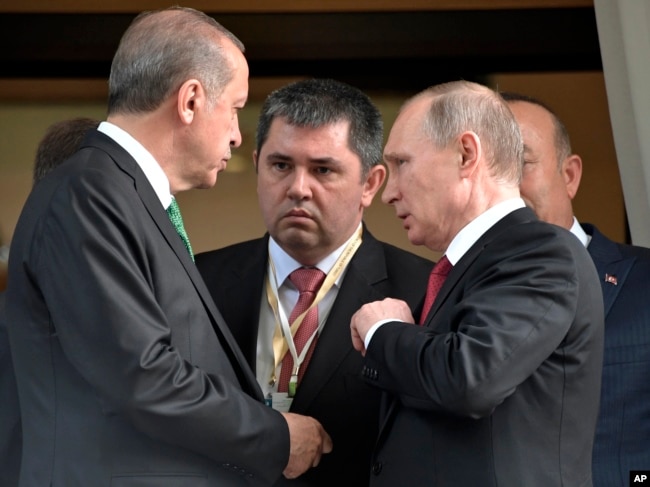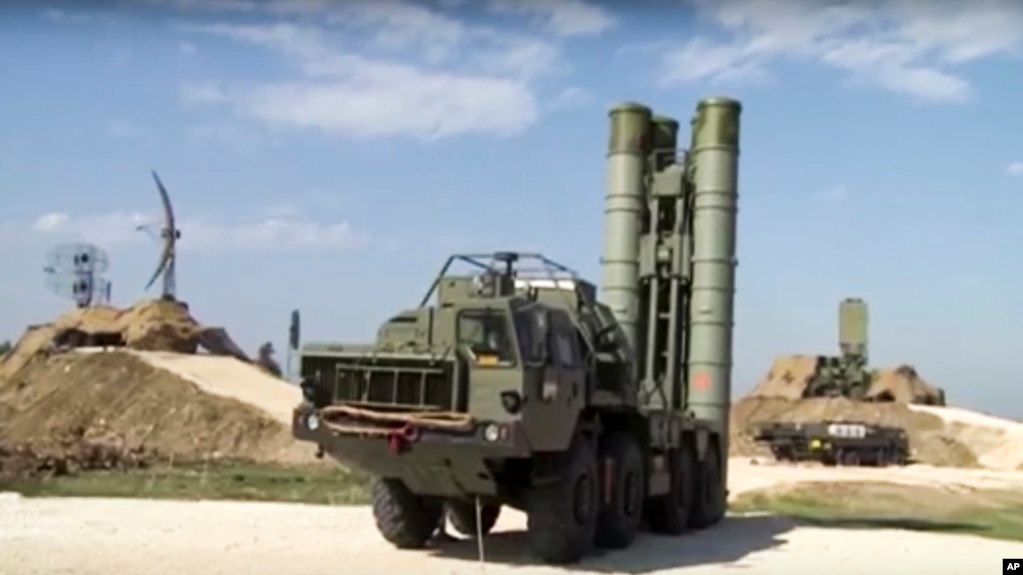Russian S-400 air defense missiles are being deployed at Hemeimeem air base in Syria, Nov. 27, 2015. Turkey has placed an order with Moscow for several such systems in a deal valued at $2.4 billion.
ISTANBUL —
Turkey's President Recep Tayyip Erdogan says Ankara has agreed to purchase Russia’s S-400 missile systems, despite NATO concerns.
The controversial purchase comes as Ankara tries to court Moscow, after a Turkish jet downed a Russian bomber operating from Syria in 2015.
"We have now taken steps with Russia about this issue [buying S-400 systems]. Deals have been inked," Erdogan announced Tuesday to his parliamentary deputies. "In God's will, we will see S-400 missiles in our country and precede the process with joint production."
The Turkish president did not miss an opportunity to dismiss concerns of his NATO partners. "Why will it cause tension? A country should be in search for the ideal ways for its own security," he said.
The controversial purchase comes as Ankara tries to court Moscow, after a Turkish jet downed a Russian bomber operating from Syria in 2015.
"We have now taken steps with Russia about this issue [buying S-400 systems]. Deals have been inked," Erdogan announced Tuesday to his parliamentary deputies. "In God's will, we will see S-400 missiles in our country and precede the process with joint production."
The Turkish president did not miss an opportunity to dismiss concerns of his NATO partners. "Why will it cause tension? A country should be in search for the ideal ways for its own security," he said.
Turkey's allegiances questioned
Ankara is at loggerheads with its Western allies over their support for Syrian Kurdish groups fighting Islamic State militants, the former considered to be terrorists by Turkey, along with growing criticism over human rights.
Ankara’s NATO partners have voiced concern about the compatibility of the Russian system with its technology, along with fears that Moscow could use the S-400 as a Trojan horse to compromise NATO systems. The controversy will only add to growing questions over Ankara’s allegiances.
“NATO and EU member Greece purchased the S-300 [an earlier version of the Russian missile system] a couple of years ago,” said Zaur Gasimov, an Istanbul-based research fellow at the Max Weber Foundation working in the field of Russian-Turkish relations. "However, it is an expensive measure of the Turkish side to demonstrate its sovereignty. It is a signal to the U.S., EU and Germany ... by buying the S-400, Ankara demonstrates it's willing to get closer to Moscow.”
The Pentagon weighed in, telling VOA that the United States has "an open dialog" with Turkey on the issue. Spokesman Johnny Michael told VOA on Wednesday: "We have concerns about the purchasing of the S-400 systems, which we have relayed to the government of Turkey."
Michael said the United States emphasizes the importance of remaining compatible with the NATO system on any major defense system procurements. But he noted that "the United States and Turkey have a robust and significant defense trade and military sales relationship" and said the U.S. "is committed to expediting the delivery of equipment purchased by Turkey, when possible."
Ankara insists the missile system, which is acknowledged as being one of most effective on the market, offers the best value for its money. The deal, worth $2.4 billion, is bolstered by Russia’s commitment to transfer technology, which also is a Turkish government priority.

FILE - Turkish President Recep Tayyip Erdogan, left, speaks to Russian President Vladimir Putin, right, as he leaves
after their meeting in Putin's residence in the Russian Black Sea resort of Sochi, Russia, Wednesday, May 3, 2017.
Ankara is at loggerheads with its Western allies over their support for Syrian Kurdish groups fighting Islamic State militants, the former considered to be terrorists by Turkey, along with growing criticism over human rights.
Ankara’s NATO partners have voiced concern about the compatibility of the Russian system with its technology, along with fears that Moscow could use the S-400 as a Trojan horse to compromise NATO systems. The controversy will only add to growing questions over Ankara’s allegiances.
“NATO and EU member Greece purchased the S-300 [an earlier version of the Russian missile system] a couple of years ago,” said Zaur Gasimov, an Istanbul-based research fellow at the Max Weber Foundation working in the field of Russian-Turkish relations. "However, it is an expensive measure of the Turkish side to demonstrate its sovereignty. It is a signal to the U.S., EU and Germany ... by buying the S-400, Ankara demonstrates it's willing to get closer to Moscow.”
The Pentagon weighed in, telling VOA that the United States has "an open dialog" with Turkey on the issue. Spokesman Johnny Michael told VOA on Wednesday: "We have concerns about the purchasing of the S-400 systems, which we have relayed to the government of Turkey."
Michael said the United States emphasizes the importance of remaining compatible with the NATO system on any major defense system procurements. But he noted that "the United States and Turkey have a robust and significant defense trade and military sales relationship" and said the U.S. "is committed to expediting the delivery of equipment purchased by Turkey, when possible."
Ankara insists the missile system, which is acknowledged as being one of most effective on the market, offers the best value for its money. The deal, worth $2.4 billion, is bolstered by Russia’s commitment to transfer technology, which also is a Turkish government priority.

FILE - Turkish President Recep Tayyip Erdogan, left, speaks to Russian President Vladimir Putin, right, as he leaves
after their meeting in Putin's residence in the Russian Black Sea resort of Sochi, Russia, Wednesday, May 3, 2017.
Sanctions factor
There may be more than defense considerations, though, behind the missile purchase. Ankara is trying to persuade Moscow to end all of the economic sanctions imposed after the Turkish jet downed the Russian bomber.
Some of those sanctions have been scaled back following a succession of meetings between Erdogan and Russian counterpart Vladimir Putin. Russia has lifted an embargo pertaining to the import of some Turkish goods and has ended a ban on Russian tourists visiting Turkey, which had devastated Turkey’s lucrative tourism industry.
But Moscow is extracting a heavy price from Ankara.
"All the rest of the concessions are actually demands, which are advantageous to the Russian side. These are the sale of the S-400 air defense systems to Turkey [and] the completion of Akkuyu, the nuclear plant by Rosatom [a Russian company]," pointed out former senior Turkish diplomat Aydin Selcen, who is now an analyst. “Export of [Turkish] tomatoes is not solved yet. The issue of visas for Turkish citizens is not solved yet.”
Russia was once Turkey’s biggest export market for tomatoes, with the trade valued at $250 million annually.
During Erdogan’s March meeting with Putin, the Turkish president reportedly lobbied hard for an end to the tomato ban, to no avail. But a breakthrough may be in the offing. On the same day Erdogan announced the decision to buy the S-400, Russian Deputy Prime Minister Arkady Dvorkovich announced negotiations on the tomato ban would resume August 18.
But Moscow’s reluctance to make speedy concessions offers an insight into the wider nature of bilateral relations.
With multiple outstanding differences between Moscow and Ankara — in particular over Syria, with the two nations backing rival sides in the civil war — and Russia's support for Syrian Kurdish rebels that Ankara calls terrorists, the possibility of a re-emergence of tensions remains.
VOA Pentagon correspondent Carla Babb contributed to this story.
There may be more than defense considerations, though, behind the missile purchase. Ankara is trying to persuade Moscow to end all of the economic sanctions imposed after the Turkish jet downed the Russian bomber.
Some of those sanctions have been scaled back following a succession of meetings between Erdogan and Russian counterpart Vladimir Putin. Russia has lifted an embargo pertaining to the import of some Turkish goods and has ended a ban on Russian tourists visiting Turkey, which had devastated Turkey’s lucrative tourism industry.
But Moscow is extracting a heavy price from Ankara.
"All the rest of the concessions are actually demands, which are advantageous to the Russian side. These are the sale of the S-400 air defense systems to Turkey [and] the completion of Akkuyu, the nuclear plant by Rosatom [a Russian company]," pointed out former senior Turkish diplomat Aydin Selcen, who is now an analyst. “Export of [Turkish] tomatoes is not solved yet. The issue of visas for Turkish citizens is not solved yet.”
Russia was once Turkey’s biggest export market for tomatoes, with the trade valued at $250 million annually.
During Erdogan’s March meeting with Putin, the Turkish president reportedly lobbied hard for an end to the tomato ban, to no avail. But a breakthrough may be in the offing. On the same day Erdogan announced the decision to buy the S-400, Russian Deputy Prime Minister Arkady Dvorkovich announced negotiations on the tomato ban would resume August 18.
But Moscow’s reluctance to make speedy concessions offers an insight into the wider nature of bilateral relations.
With multiple outstanding differences between Moscow and Ankara — in particular over Syria, with the two nations backing rival sides in the civil war — and Russia's support for Syrian Kurdish rebels that Ankara calls terrorists, the possibility of a re-emergence of tensions remains.
VOA Pentagon correspondent Carla Babb contributed to this story.

1)Η Τουρκία έχει παραγγείλη τα F-35, αγοράζει τους S-400, κατασκευάζει αεροπλανοφόρο και πυραύλους μεγάλης εμβέλειας, έχει και πρόγραμμα κατασκευής πυρηνικών εργοστασίων για ενέργεια, με κρυφή ατζέντα την κατασκευή πυρηνικών όπλων. Είναι μάλιστα άγνωστο τί κατέχει, πέραν αυτών που υπάρχουν επισήμως στο Ιντσιρλίκ.
ΑπάντησηΔιαγραφήΤά προγράμματα αυτά τα έχει καταφέρει λόγω της μεγάλης ανάπτυξης της οικονομίας της, το ΑΕΠ της υπολογίζεται για το 2017 στα 861 δισ. $, και στην μεγάλη αύξηση του πληθυσμού της που έχει ξεπεράσει τα 79.8 εκατομμύρια κατοίκους το 2017.
2)Η Ελλάδα από την άλλη πλευρά έχει ένα ΑΕΠ γύρω στα 194 δισ. $ και πληθυσμό περίπου 11 εκατομμύρια. Η συρρικνούμενη, εδώ και χρόνια, οικονομία της με το δημόσιο χρέος στα 325 δισ. ευρώ ασφαλώς δεν θα ανακάμψει στο ορατό μέλλον. Επιπλέον ο γηγενής ελληνικός πληθυσμός της χώρας μας γερνάει και αντικαθήστατε, ύπουλα και με σχέδιο, από μουσουλμάνους μετανάστες, ώστε η χώρα να γίνει πολυεθνική και πολυθρησκευτική. (π.χ. Γιουγκοσλαβία προτού διαμελισθεί, Λίβανος).
Όσον αφορά εξοπλισμούς, χρήματα δεν υπάρχουν ενώ απειλούμεθα στην Κύπρο, στην Θράκη, στα νησιά του Ανατολικού Αιγαίου και στην Κρήτη. Ακόμα μέχρι και η Αλβανία μας απειλεί στην Ήπειρο.
Συμμάχους τυπικά έχουμε. Οι υπερδυνάμεις μάλιστα αγωνίζονται να προσεταιριστούν την Τουρκία, πλειοδοτώντας στην παροχή υπερσύγχρονων όπλων.
3)Εδώ και χρόνια η χώρα μας υφίσταται μία αδιάκοπη προπαγάνδα, από πολιτικούς και ΜΜΕ, με σκοπό τον αποχριστιανισμό, τον αφελληνισμό και την πρόωθηση της κάθε είδους ανηθικότητας στον Ελληνικό λαό, ώστε να διαλύσουν το Ελληνικό Έθνος που το χαρακτηρίζει το ομόαιμον, το ομόθρησκον, το ομόγλωσσον και το ομότροπον.
Μάλιστα το υπουργείο παιδείας προσπαθεί να "επιμορφώσει" τους μαθητές, δια μαθημάτων επιλογής φύλου, ενώ χρειαζόμαστε Σπαρτιάτικη εκπαίδευση επειδή είμαστε λίγοι εναντίον πολλών.
4)Εάν δεν διορθωθούν ταχύτατα τα κακώς κείμενα, τουλάχιστον αυτά που είναι εφικτά, κινδυνεύουμε με νέες επώδυνες απώλειες.